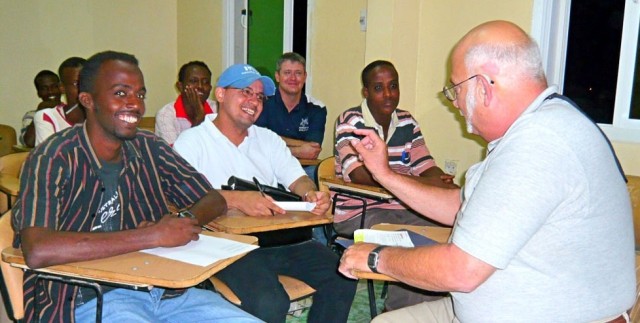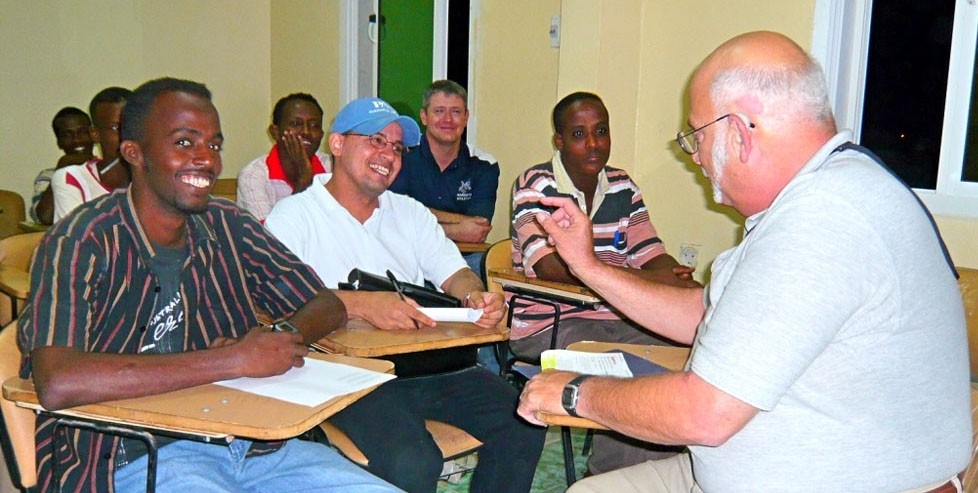LIVORNO, Italy (Army News Service, March 11, 2008) - Deployed to Africa, in a sliver of a country between Somalia and Ethiopia, an education counselor from Camp Darby, Italy, is assisting students beyond the fence perimeter.
Alan Moses, normally a test examiner with the U.S. Army Garrison Livorno education center, spends his days in Djibouti helping U.S. troops with their schooling concerns, while spending his evenings meeting with Djiboutian students.
Serving on a 180-day rotation for Combined Joint Task Force-Horn of Africa, Moses believes providing education opportunities goes beyond supporting his fellow Americans who live and work on Djibouti's Camp Lemonier. For example, he works with Africans as they practice their English and study U.S. culture. He puts in the extra effort, he said, becuase he believes education will help stabilize the impoverished country.
"I feel that by volunteering ... I help them to succeed in earning a better living," Moses said. "But more importantly, I am providing them another person's outlook on life and the world we live in."
A college field representative told Moses about the program in Djibouti - run by the Combined Joint Task Force staff, the State Department and the U.S. Agency for International Development - where volunteers visit classrooms to help students with their English, Moses said.
These Camp Lemonier volunteers - including U.S. servicemembers, civilian employees, and contractors - work long days on Camp Lemonier, then venture off post to sites that range from modern downtown buildings to shacks partially supported by tin and bits of wood in the middle of a refuge camp.
"These students have had limited official language training (about one year), but they study hard so that they can communicate in English," said Moses. "In fact, we recently had Paul Salopek - a two-time Pulitzer Prize winning reporter from the Chicago Tribune and a foreign correspondent now based in South Africa - spend a week visiting us. The students really enjoyed talking with him."
One such student, named Ishmael, said learning English is important "because it is the international language."
"Coming to this class improves opportunities for me," Ishmael said. "I want to get my master's degree at an American university. And since English is (used in the business of) oil, it is essential for me to learn it."
Moses labeled the sessions that Ishmael and other students attend as "interactive." Students select topics to discuss, peppering the American volunteers with questions that, Moses said, provide Djiboutians a better understanding of diverse American culture, values and norms.
"The discussion at class can get quite lively," Moses said, laughing. "(One) week, the subject was the 'Future of Africa,' and eventually led to a discussion of the current problems in Kenya."
And while the students soak in what is taught, the Djiboutians believe they can enlighten the U.S. servicemembers and civilians as well.
"Americans should be encouraged to learn more about Africa ... as it has many cultures," said Mohammad. "If Americans understand these cultures, then America may be able to assist the countries of Africa to settle differences among themselves."
Besides teaching off base, Moses, who will be returning to Campy Darby in April, said there are other ways people - even those not deployed - can assist the program. For example, his wife, Melinda, the kindergarten and first-grade school teacher at Livorno Unit School, has asked fellow teachers to donate books that will be sent to Camp Lemonier.
Moses and representatives of CJTF-Horn of Africa and the U.S. Embassy will distribute the books among nine cultural centers.
(Joyce Costello serves with USAG Livorno Public Affairs.)


Social Sharing